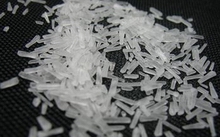 Monosodium glutamate, or MSG, is a food additive used as a preservative and flavor enhancer, and is found in nearly all foods in varying amounts, and under multiple names. This noxious additive creates substantial side effects and has been implicated as a poison that can intensify symptoms of Alzheimer's disease.
Monosodium glutamate, or MSG, is a food additive used as a preservative and flavor enhancer, and is found in nearly all foods in varying amounts, and under multiple names. This noxious additive creates substantial side effects and has been implicated as a poison that can intensify symptoms of Alzheimer's disease.Natural glutamate is an amino acid found in all foods containing protein -- and produced by the human body -- is important for healthy metabolism and brain function. However, when excess amounts of glutamate are added to food by manufacturers in the form of MSG, neurotoxic side effects can result. When foods are processed, small amounts are activated by heat, and transformed into a substance that can cause individuals to react negatively, promoting long-term damage to the nervous system.
In May of 2000, John's Hopkins announced that MSG is a neuro-stimulant that increases hypersensitivity, over-stimulating the immune system. Additionally, researchers Patrick and Edith McGreer reported in the June 2000 issue of Scientific American that Alzheimer's disease may produce an auto-immune disease-like reaction, where the body's natural defense system turns against itself. Beta amyloid protein deposits in the brain appear to increase the toxicity of MSG, contributing to accelerated deterioration in Alzheimer's patients, according to the Journal of Neuroscience, and known to researchers since 1992.
Because MSG over-stimulates the nervous system, both Alzheirmer's and allergy patients experience hypersensitivity to a variety of external stimuli such as tobacco smoke, pollen, airborne chemicals, and foods to which they may be allergic. The McGreers noted that the use of anti-inflammatory substances may be the secret to treating Alzheimer's patients, reducing the effects of glutamates.
Avoiding MSG
A glutamate-blocking pharmaceutical drug known as Dimebon, has been used as an anti-histamine, and shows some promise as a neuro-protective blocking agent that calms the nervous system. However, it seems counter intuitive to give a drug to block the effects of glutamates from MSG instead of protecting patients by not feeding them a neuro-toxin in the first place. Many nursing homes serve elderly patients-- who may be suffering from end stage Alzheimer's -- foods that are low in sodium and high in MSG, used as a flavor enhancer.
Protection against MSG overdosing
Helpful methods to protect Alzheimer's patients from being exposed to overdoses of glutamates are easy to execute.
· Check package labels and avoid foods with MSG and any of its myriad of names. This step alone will contribute to preventing nerve cell degeneration for anyone.
· Additionally, avoid eating at places known for using MSG in recipes, such as Chinese and other Asian restaurants. Soy sauce always contains MSG unless it says it's MSG-free on the label.
· Always ask for NO MSG when you eat in restaurants
Calming the nervous system
Certain supplements, vitamins, herbs and homeopathic remedies reduce inflammation and calm the nervous system, supporting the body and relieving stress which may contribute to the glutamate reaction.
Depending on the symptoms of the patient, remedies such as turmeric, B-vitamins, Inositol, Alpha Lipoic Acid, Non-GMO Lecithin, Cayenne, homeopathic Chamomilla, Nux Vomica, Arsenicum, and Gingko biloba might be chosen. Ask your natural health practitioner about these and others.
Reducing allergic response
Because glutamates increase an allergic response, it is logical that glutamate-blocking antihistamine treatments that reduce allergy symptoms would benefit Alzheimer's patients. Herbs like chamomile, ginger, green tea, lavender, butterbur and peppermint are only a few a many choices for treatment which might also include homeopathic treatment.





